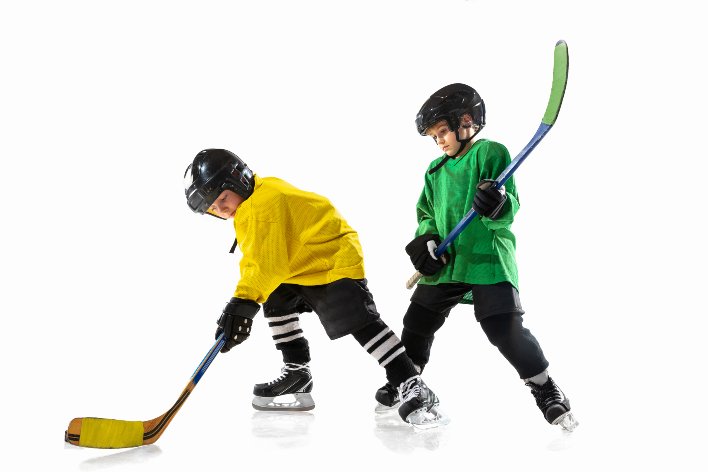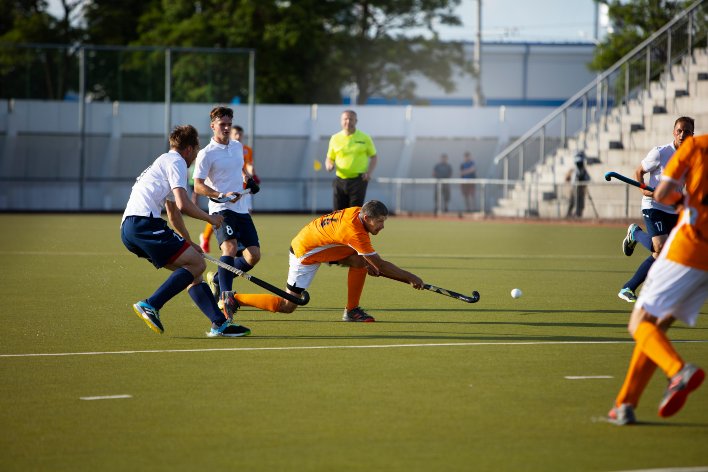Choosing the Right Hockey Program for Kids: A Comprehensive Guide
By Pinkey Sharma |
Date 08-08-2024

Table of Contents
Admissions Open for
While choosing a hockey program for your kid, you need to consider things like appropriate coaching for his age, player development, the program structure, and team environment. A well-chosen program would be the one which correlates with the present skill level of the child, interests, and long-term goals. The program shall be in a balance of learning and competition. Look out for programs emphasizing basic skills, teamwork, fun, and positive enriching experience while playing hockey.
Understanding the Landscape of Hockey Programs
One of the most critical decisions you'll make when your child shows an interest in either field or ice hockey is the right program for their athletic career and experience. This paper discusses the various aspects of the hockey programs. It includes the types of programs available, the benefits of participating in such programs, and the key considerations that parents have to keep in mind when selecting a hockey training program.
The Importance of Hockey Programs
The hockey programs are critically important in the upbringing of the young athlete, offer structured training with respect to the development of skills and competition, and therefore, such participation will instill in your child's life physical fitness, teamwork, and discipline and yield a deeply rooted love for the game. Furthermore, a good program lays a foundation for your son's advanced career in the game, should he choose to extend that far and wants to play at the collegiate or professional levels, or to simply maintain fitness through recreational activities later in life.
Types of Hockey Programs
Ice Programs
Such hockey programs usually come with a wide range of levels including beginner, intermediate, and advanced Some of them include

Learn-to-Skate Programs: Such programs are fit for younger children who are making their first experience with skating. They usually work well in teaching basic skating, including the realization of balance and coordination.
Youth Hockey Leagues: These are basically organized leagues in which kids are able to involve themselves in daily practice sessions and games. The kids are commonly divided by their ages and their levels of proficiency.
Travel Hockey Teams: These are more competitive teams where you must travel to other regions to play against their team. Expect these to be much more of a time commitment, and honestly, you must have skill.
Hockey Camps and Clinics: These are more like short-term intensive training sessions more focused on a particular skill or part of the game. For example, they may have one for shooting, defense, or perhaps even goal tending.
Field Hockey Programs
These are for children interested in learning how to play field hockey. They can include:
Youth Field Hockey Leagues: Many are similar to the ice hockey leagues in training and offer routine practice and games for kids from any skills level.
Field Hockey Clubs: Most clubs offer training in a bit more specifics and give a platform for participating in regional and national tournaments.
Field Hockey Camps: Generally conducted in summers, it's a very hard-working practicing period on skill and tactical development in the game.
School Programs: Field hockey is part of many schools' athletics programs; thus, regular training and competition are provided.
Why Take Part in Hockey Programs?
Physical Advantages
Hockey is, by nature, a robust game that guarantees numerous benefits health-wise, including:
- Better cardiovascular fitness
-
More strength and endurance
-
Improved coordination and balance
-
Greater agility and flexibility
Mental and Social Advantages
Besides this, involvement in any hockey program comes with a number of mental and social benefits, which include the following:
-
Teamwork skills and communication abilities
-
Confidence and self-esteem acquiring
-
Discipline and time management
-
Friendship and social skills
Key Findings That Can Influence the Hockey Program Chosen
Through the Process of Child Evaluation on the Basis of Interest and Ability. Knowing what your child is interested in and able to do now will inform which program is best for your child.It is important to research the potential hockey programs for children to locate the perfect fit. The following steps can help guide one's research:
Program reputation: Look for a program that has a strong reputation in the development of young players. They should be able to prove reviews and testimonials from other parents and players on some of their success stories.
Coaching Staff: Inquire about the background and experience of the coaching staff. Coaches with a playing or coaching background at a high level bring invaluable direction to the athletes.
Facilities: Take note of the quality of the facilities where the program takes place. Program Structure: Know the structure of the program: how many practices and games, level of competition, and goals of the program overall.
Logistical Considerations
Logistical considerations can really play a part in where you choose to go with something. These are some things that you'll keep in mind here:
Location: Select easily accessible programs to save valuable time and money spent on transportation.
Cost: Take into account the total cost such as the cost of the program, registration fees, equipment, travel expenses, and the other associated costs involved.
Schedule: Ensure that the schedule of the program works out with that of your family's availability and commitments.
Safety and Inclusivity
There are two critical aspects to look for when choosing a hockey program: safety and inclusivity. Make sure the hockey program offers the following:
Safety Protocols: The program has good safety protocols viz-a-viz the use of the right kind of equipment, trained medical professionals, and emergency procedures.
Inclusivity:Look for programs that provide an open and respectful environment to all participants, be they male, female, black, or white.
Evaluating and Choosing the Best Hockey Program for Your Child: Site Visits and the Interview Process
The Site Visit
There is much to be learned by observing the facilities of the program of interest. During the visit, keep an eye out for the following:
Cleanliness and Appearance: Check whether the facilities neat and clean.
Safety Precautions: Are there visible safety precautions, such as properly added boards and goalposts for ice hockey and safe playing surfaces for field hockey.
Atmosphere: Watch the atmosphere during practices or games. Is the atmosphere positive and encouraging.
Interviews
Intelligent questions to coaches, directors, and other parents can ensure that there is more to the hockey program than meets the eye. Possibly ask:
Coaching Philosophy: What is the program's coaching philosophy? Is it congruent with your child's developmental needs.
Training Approach: What is the approach to skill development/training? Is there any scope for individual coaching?
Parental Involvement: What do parents expect or encourage by way of parental involvement?
Success Stories: Is it possible for the program to provide examples of the past participants who either succeeded or progressed in the sport? Choose a program that offers the type of skill development appropriate to your child's current level.
The programs include
Beginner Programs: If your youngster is a true beginner, look for programs that explicitly tend to fundamental skills and basic game understanding.
Intermediate and Advanced Programs: As your player becomes older or more experienced, find programs that provide advanced training, tactical instruction, and competitive opportunities.
Level of Competition
The competitive level should be commensurate with the abilities and desires of your child. Consider the below points:
Recreational Programs: These are programs that are not as competitive, highlighting fun and participation. They will be good for beginners and all types of athletes who are to operate a relaxed environment.
Competitive Programs: The programs are more advanced and are of high intensity running at a higher level of commitment. They are best suited for children who take their athletic skills seriously with the aim of being able to compete at a higher level. Making the Final Decision.
Weighing Pros and Cons
After you have gathered all the information from the above, make a list of the pros and cons for the different programs you are considering. This will help you in your decision to determine which program will best meet your child's needs and your family's priorities.
Including Your Child
Engaging the child in the decision-making process will make him/her feel a part of the decision. Talk about the alternatives together with your child, his/her feelings toward and opinion about each programme. Tying up elements to ensure the child is excited and comfortable about the choice can make for a much more positive experience.
Final Evaluation
Before finally deciding on the programme, make sure you have revisited the following key considerations:
Alignment with Goals: Does the programme align with your child's short-term and long-term hockey goals.
Commitment Level: Are you and your child ready for the level of commitment the program demands.
Support and Resources: Does the program extend the support and resources your child will require for development.
Check that your child is properly equipped and geared with all the equipment/gear required for the program. If needed, this may include
For Ice Hockey: Skates, helmet, pads, gloves, stick, appropriate clothing.
For Field Hockey: Stick, shin guards, mouth guard, appropriate footwear, and clothing. Physical and Psychological Readiness. Prepare your child physically and mentally for the program.

These may require
Physical Conditioning: Such as participation in pre-season conditioning exercises to get fit and reduce injury.
Mental Preparation: This may involve discussion regarding the goals set, expectations, and ways of coping with challenges they come along the way.
Parental Support
Support the program with positive reinforcement the whole process, such as
Attendance at Games and Practices: Attend all games and practices possible for the athletes.
Support: Use positive reinforcement to support your child and in providing constructive feedback.
Communicate: Keep open lines of communication with coaches or program staff. Monitor how things are going with your child, and address immediately any concerns.
Conclusion
The type of hockey program you choose for your son or daughter will be a big decision, and you will need a lot of research and consideration. An awareness of the different programs available for involvement in hockey, considering the benefits of such programs against the key factors—you can help your child make an informed decision which will enable them to maximize their experience and development in hockey. Always ensure and involve the child in the decision and be supportive to help them succeed in their chosen program.
FAQ’S
How to choose a youth hockey Team?
Look for a team with skilled coaches, a positive environment, and a strong track record of player development.
How do i choose a hockey stick for my child?
Select a stick based on your child's height, skill level, and preferred playing style.
How do you introduce hockey to kids?
Start with basic skills, make it fun, and encourage participation in beginner clinics or youth leagues.
Please don’t hesitate to contact we’re always here to help!
Related Blogs
Learning Hockey skills: Unlock your hockey potential through essential skills and techniques.
The Benefits of Playing Hockey: Maximize hockey benefits with expert tips on skills, fitness, and strategies.
Safety in Youth Hockey: Discover essential safety measures for ensuring safe youth hockey play.
CBSE Schools In Popular Cities
- CBSE Schools in Bangalore
- CBSE Schools in Mumbai
- CBSE Schools in Pune
- CBSE Schools in Hyderabad
- CBSE Schools in Chennai
- CBSE Schools in Gurgaon
- CBSE Schools in Kolkata
- CBSE Schools in Indore
- CBSE Schools in Sonipat
- CBSE Schools in Delhi
- CBSE Schools in Rohtak
- CBSE Schools in Bhopal
- CBSE Schools in Aurangabad
- CBSE Schools in Jabalpur
- CBSE Schools in Jaipur
- CBSE Schools in Jodhpur
- CBSE Schools in Nagpur
- CBSE Schools in Ahmednagar
- CBSE School In Tumkur

Call Us to know more about Orchids
Swipe Up

















